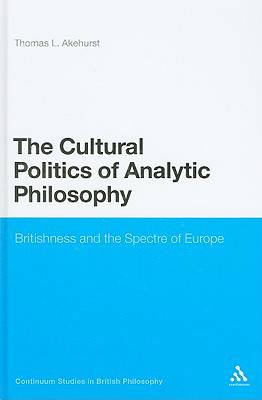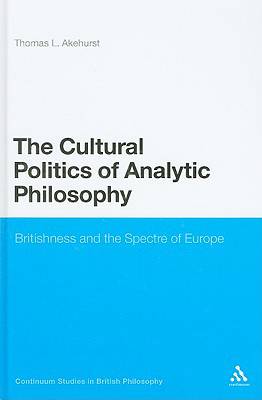
- Afhalen na 1 uur in een winkel met voorraad
- Gratis thuislevering in België vanaf € 30
- Ruim aanbod met 7 miljoen producten
- Afhalen na 1 uur in een winkel met voorraad
- Gratis thuislevering in België vanaf € 30
- Ruim aanbod met 7 miljoen producten
Zoeken
The Cultural Politics of Analytic Philosophy
Britishness and the Spectre of Europe
Thomas L Akehurst
€ 373,45
+ 746 punten
Uitvoering
Omschrijving
British Analytic Philosophy in the Twentieth Century examines three generations of analytic philosophers, who between them founded the modern discipline of analytic philosophy in Britain. The book explores how philosophers such as Bertrand Russell, A.J. Ayer, Gilbert Ryle and Isaiah Berlin believed in a link between German aggression in the twentieth century and the nineteenth-century philosophy of Hegel and Nietzsche.
Thomas L. Akehurst thus identifies in this political critique of continental philosophy the origins of the hugely significant faultline between analytic and continental thought, an aspect of twentieth-century philosophy that is still poorly understood.
The book also uncovers a tripartite alliance in British analytic philosophy, between nation, political virtue and philosophical method. In revealing this structure behind the assumptions of certain analytical thinkers, Akehurst challenges the conventional wisdom that sees analytic philosophy as a semi-detached narrowly academic pursuit. On the contrary, this important book suggests that the analytic philosophers were espousing a national philosophy, one they believed operated in harmony with British thinking and the British values of liberty and tolerance.
Thomas L. Akehurst thus identifies in this political critique of continental philosophy the origins of the hugely significant faultline between analytic and continental thought, an aspect of twentieth-century philosophy that is still poorly understood.
The book also uncovers a tripartite alliance in British analytic philosophy, between nation, political virtue and philosophical method. In revealing this structure behind the assumptions of certain analytical thinkers, Akehurst challenges the conventional wisdom that sees analytic philosophy as a semi-detached narrowly academic pursuit. On the contrary, this important book suggests that the analytic philosophers were espousing a national philosophy, one they believed operated in harmony with British thinking and the British values of liberty and tolerance.
Specificaties
Betrokkenen
- Auteur(s):
- Uitgeverij:
Inhoud
- Aantal bladzijden:
- 220
- Taal:
- Engels
- Reeks:
Eigenschappen
- Productcode (EAN):
- 9781847064509
- Verschijningsdatum:
- 25/04/2010
- Uitvoering:
- Hardcover
- Formaat:
- Ongenaaid / garenloos gebonden
- Afmetingen:
- 163 mm x 236 mm
- Gewicht:
- 517 g

Alleen bij Standaard Boekhandel
+ 746 punten op je klantenkaart van Standaard Boekhandel
Beoordelingen
We publiceren alleen reviews die voldoen aan de voorwaarden voor reviews. Bekijk onze voorwaarden voor reviews.








